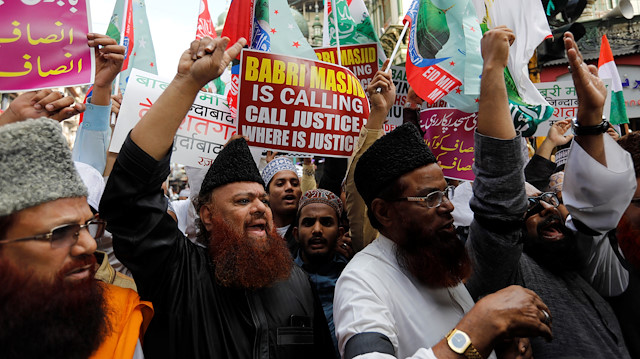
Hindus in Pakistan no longer fear violence on Babri Mosque demolition anniversary on Dec. 6
Jawaharlal Advani, a Hindu residing in Pakistan’s commercial capital Karachi, has vivid memories of Dec. 6, 1992, when a charged Muslim mob, calling for revenge, was marching towards country’s famous Shri Swami Narayan temple.
The mob was in a fit of rage after a Hindu mob had demolished 16th-century Babri Mosque, in nearby India.
Advani together with other staff and worshipers at the temple were not sure about their fate.
“It was a horrific scene. Thousands of charged people were trying to enter the temple premises. But Thanks to the army and local Muslim community that helped and held them off,” Advani told Anadolu Agency.
He added: “No damage to life or temple’s infrastructure occurred due to the army’s swift action.”
In Pakistan some 30 temples were attacked, 25 of them across the southern province of Sindh, where 85% of the Hindus in Pakistan live. Since then all these temples have been either rebuilt or repaired.
In India, then Prime Minister P. V. Narasimha Rao had also pledged to rebuild the Babri Mosque, in a televised address to the nation. Hotwani, no longer foresees any violent reaction from Pakistani Muslims on the 28th anniversary of the demolition of Babri Mosque on Dec. 6. But he had feared recurrence of riots on Nov 19, when Indian Supreme Court handed over the site of Babri Mosque to Hindus.
On Nov 19, Ram Nath Maharaj had arrived at the Shri Panchmukhi Hanuman temple in Karachi to oversee preparations for routine Saturday prayers.
“I was fearing similar riots, imagining angry mobs attacking the temples, and beating us up. I kept praying and making calls to my family members and friends to be careful, and do not come out of homes. But thank God, nothing like that happened,” he said.
Before he entered the premises, he noticed the deployment of extraordinary security around the temple.
Maharaj, the caretaker of the 1,500-year-old temple, entered the premises, and started to prepare for the prayers.
But shortly afterwards, he came to know that the Indian Supreme Court had handed the site of historic mosque to Hindus for the construction of a temple.
“It came like a bombshell to me as I was away from television for last few days due to some special prayers. It just reminded me the grim memories of 1992 when Babri Mosque was demolished triggering violence against Hindus here,” Maharaj 45, who with his Muslim and Christian friends took part in relief activities for those affected by the riots, told Anadolu Agency.
Hindu nationalists gathered at the disputed site on Dec. 6, 1992, and destroyed the mosque named after Mughal Emperor Babur. Around 2,000 mostly Muslims were killed in communal riots across India.
“Not even a single temple or Hindu was attacked after the Indian Supreme Court’s verdict. Thanks to local (Muslim) community, law enforcing agencies, and on top of all, the religious leadership, that did not exploit the judgment to incite Muslims against Hindus,” he added.
Hindus, the largest minority in Pakistan. make up 3% of the country’s more than 200 million population.
Pakistan is home to several sites revered by Hindus. The Katas Raj temple in northeastern Chakwal district and Sadhu Bela temple in southern Sukkur district are the two most visited rites by Hindus across the world.
According to local media, the government plans to reclaim and restore 400 temples, which have been illegally occupied by land grabbers, to Hindus across the country.
“If I compare the two situations, there is simply no comparison. In 1992, there were riots, fear and bloodshed but in 2019, there is nothing like that,” said Maharaj.
- No more violence
Hotwani, said that things have gradually changed in the past 28 years in Pakistan.
“Increasing literacy compounded by the government and media role, have made even many of those who were involved in violence [against Hindus] in 1992, that this [violence] is not in favor of Pakistani society,” Hotwani, a former judge, told Anadolu Agency.
“We are carrying out our routine activities without fearing any reaction on Dec 6,” he said sitting in his small office adjacent to the temple, which was attacked in 1992.
Contrary to other Hindus, Hotwani did not bother about security on Nov. 9.
“I did not even request security. However, the police beefed up security around the temple at their own to avert any untoward incident.”
Advani, a member of the temple’s managing committee, said it would be unjust not to mention local Muslims, who thwarted attacks and ensured safety of Hindus.
“They (Muslims) offered us their houses to take shelter. Even, their women came up to save our women,” he said.
- Babri Mosque dispute
The Babri Mosque is said to have been built by Mughal Emperor Babur in 1528.
In 1885, a Hindu religious body filed a case in Faizabad court asking for permission to construct a temple to honor Ram on the premises of the Babri Mosque. The permission was denied.
In 1949, a group of Hindus entered the premises of the mosque and installed an idol of Ram. Instead of removing the idol, the administration locked the mosque. However, an official and a Hindu priest were given charge to look after the place.
In 1986, the district administration of Faizabad, under which Ayodhya city comes, opened the premises to Hindus, allowing them to carry out rituals.
The situation remained calm until December 1992, when thousands of activists belonging to extremist Hindu groups and political parties along with BJP leaders entered Babri Mosque and demolished it.
The case over the dispute had been languishing in India’s legal system for years without a final outcome. The Indian Supreme Court finally delivered a judgment Nov. 9 on the ownership of the site.


